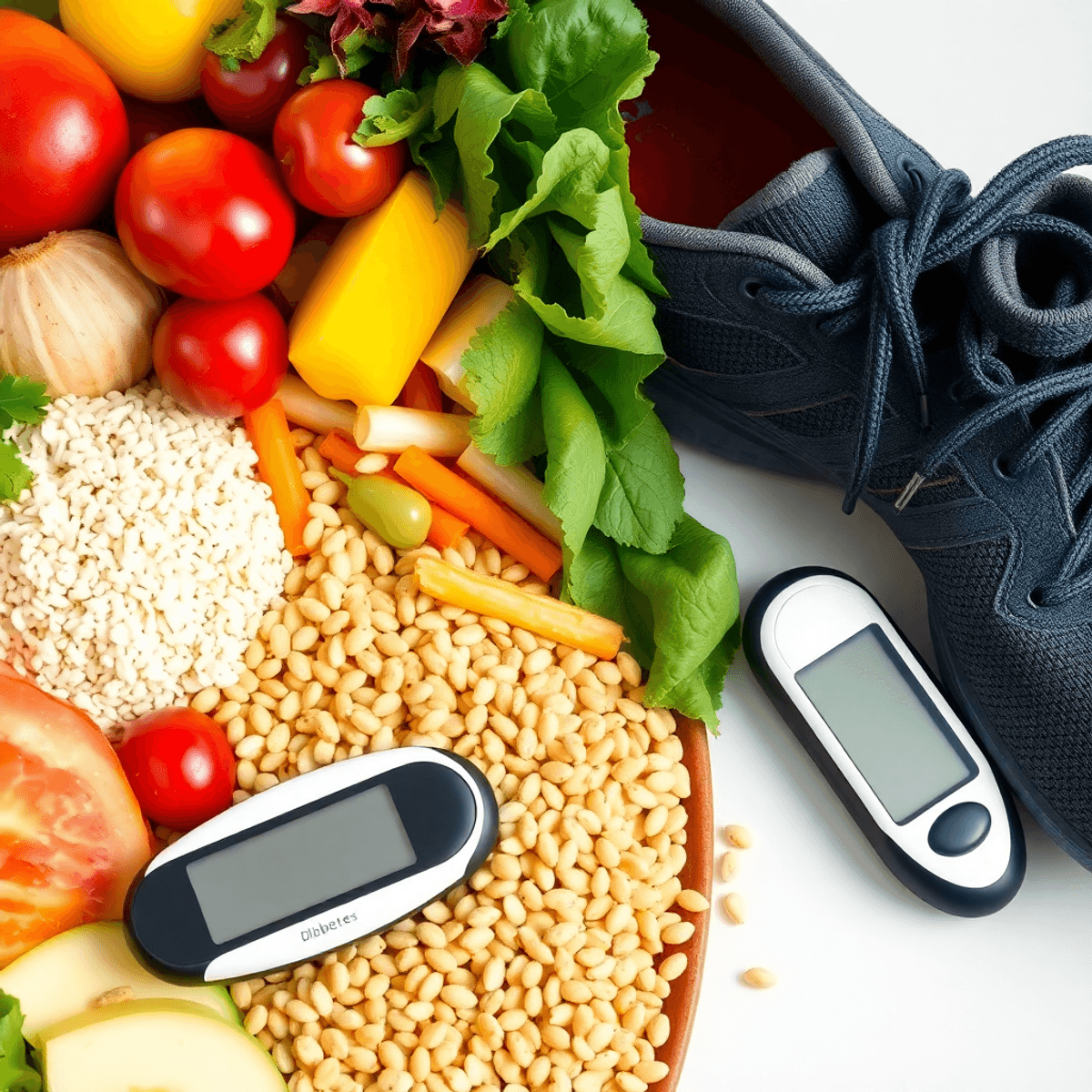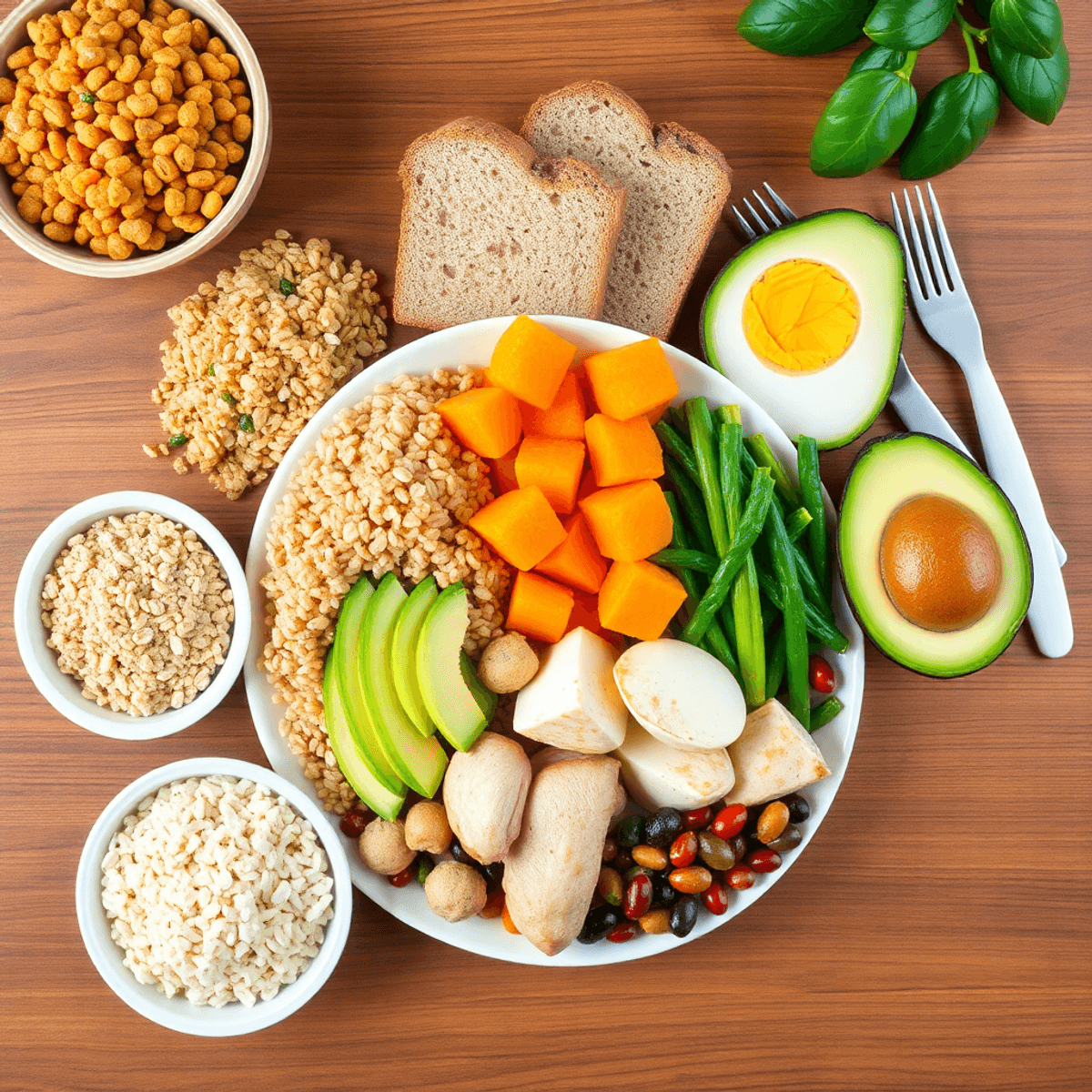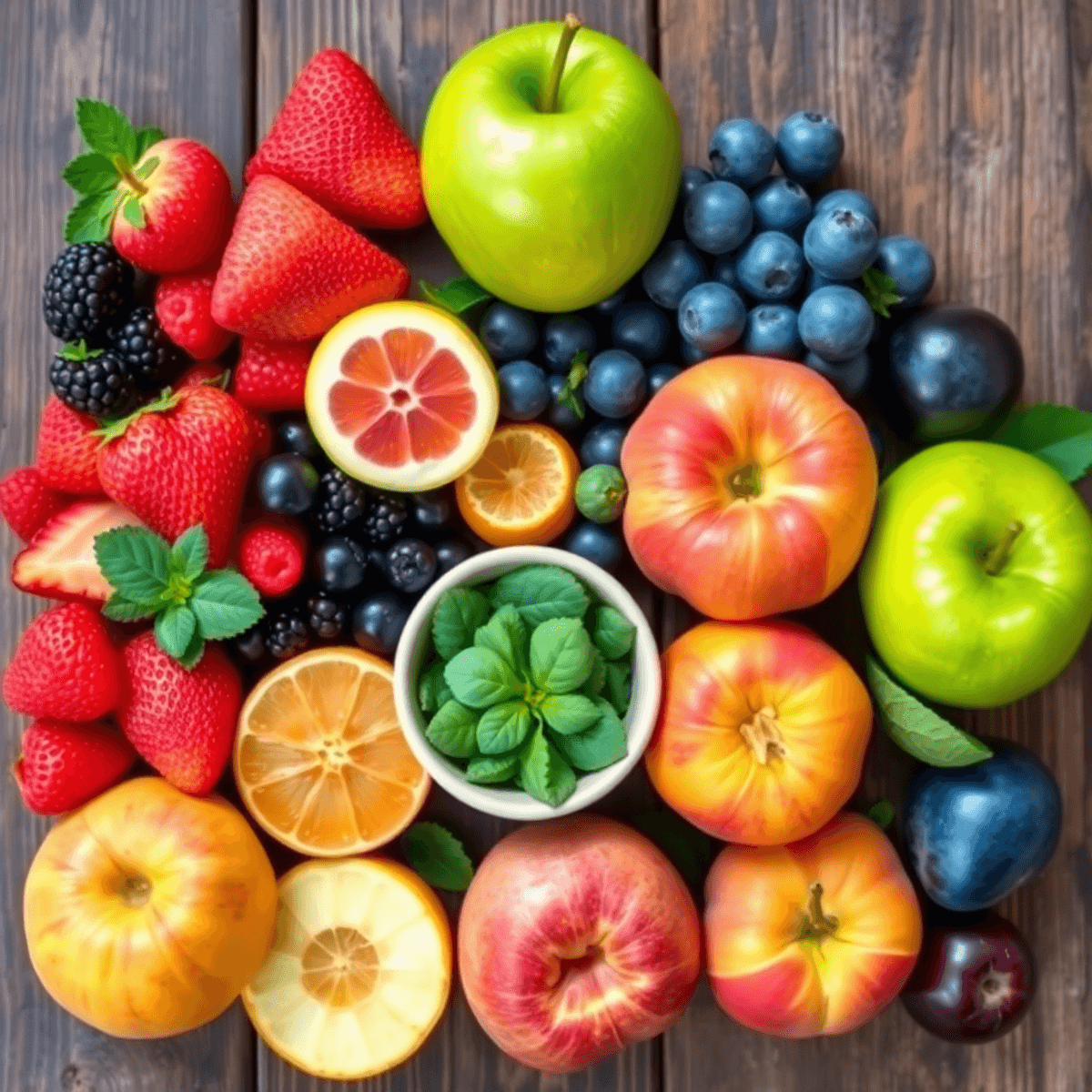Will Eating Sugar-Laden Foods Turn You Into a Diabetic?
"Does sugar cause diabetes?" This question comes up a lot in health discussions, showing how worried people are about sugar in their diet.
The truth is, the connection between sugar and diabetes isn't as simple as it seems. Here's what research shows: just because you eat sugary foods doesn't mean you'll definitely get diabetes. The link between how much sugar you consume and your risk of developing diabetes is more complicated, especially when considering the principles of a diabetic diet.
Understanding Your Body's Relationship with Sugar
Think of it this way - your body processes sugar like a scale that needs to stay balanced. If you regularly eat too many sugary foods and drinks, this balance can shift towards:
- Gaining weight which can lead to obesity
- Becoming less sensitive to insulin
- Having trouble regulating blood sugar levels
- Increasing the chances of getting type 2 diabetes

Your risk of developing diabetes depends on various things besides just how much sugar you eat - such as your genes, how active you are, and what your overall diet looks like. While sugar isn't the main culprit here, it does play an important part in the bigger picture of metabolic health and diabetes risk.
Understanding Diabetes Types
Diabetes has two main types, each with different causes and characteristics:
1. Type 1 Diabetes
- An autoimmune condition where the body attacks insulin-producing cells
- Develops independently of diet or lifestyle choices
- Typically diagnosed in childhood or early adulthood
- Requires lifelong insulin therapy for management
2. Type 2 Diabetes
- Results from the body's reduced ability to use insulin effectively
- Strongly influenced by lifestyle factors:
- Diet high in processed foods
- Physical inactivity
- Excess body weight
- Poor sleep patterns
- Can often be prevented or managed through lifestyle modifications
Your genetic makeup plays a role in both types, but environmental factors significantly impact type 2 diabetes development. While type 1 diabetes requires immediate medical intervention, type 2 diabetes often develops gradually, providing opportunities for early intervention through lifestyle changes.
Research shows 90-95% of diabetes cases are type 2, highlighting the importance of understanding modifiable risk factors. Your daily choices in diet, physical activity, and other lifestyle aspects can significantly influence your risk of developing type 2 diabetes.
How Sugar Intake Affects Diabetes Risk
Your body's relationship with sugar is complex. When you consume foods high in added sugars, your blood glucose levels spike rapidly. Your pancreas responds by releasing insulin to help cells absorb this glucose for energy.
Regular high sugar intake forces your pancreas to work overtime, pumping out more insulin. Your cells can become less sensitive to these frequent insulin surges - a condition known as insulin resistance. This resistance makes it harder for your body to regulate blood sugar effectively.
The Impact of Added Sugars on Your Body
Added sugars pack a hefty caloric punch without providing essential nutrients. These empty calories often lead to:
- Weight gain
- Increased belly fat
- Higher inflammation levels
- Disrupted hunger signals
Research shows that drinking just one sugar-sweetened beverage daily increases diabetes risk by 18%. The risk multiplies with each additional serving.
How Added Sugars Differ from Natural Sugars
Your body processes added sugars differently than natural sugars found in whole foods. While fruit contains fiber that slows sugar absorption, added sugars enter your bloodstream quickly, creating dramatic blood glucose fluctuations that strain your metabolic system.
In light of these risks, many individuals are exploring alternatives like erythritol, a sugar-free substitute that offers certain benefits and may be safer for those managing their sugar intake. However, it's essential to understand the pros and cons of such substitutes before making a switch.
Another common alternative that people consider is jaggery. While it is often touted as a healthier sweetener, its actual impact on blood sugar levels needs careful evaluation, especially for diabetics.
Despite the challenges posed by high sugar intake, there are ways to enjoy sweet treats responsibly. For instance, traditional sweets can be modified to fit a healthier lifestyle. A perfect example of this is the Kaju Katli and Motichoor Ladoo combo, which are made with natural sweeteners perfect for festive gifting or personal consumption without compromising on taste.
Foods That Impact Diabetes Management
Understanding which foods affect blood sugar levels is crucial for diabetes management. Natural sugars found in fruits and vegetables come packaged with fiber, vitamins, and minerals, making them vastly different from added sugars in processed foods.
Smart Food Choices for Blood Sugar Control:
- Whole fruits over fruit juices
- Fresh vegetables, especially leafy greens
- Complex carbohydrates like brown rice and quinoa
- Lean proteins and healthy fats
For those with a sweet tooth, it's important to know that there are alternatives available. For instance, sugar-free diabetic friendly sweets like the ones offered by Artinci can be a delicious yet safe option.
Foods to Limit or Avoid:
- Sugar-sweetened beverages
- Candy and desserts
- White bread and refined grains
- Processed snack foods
- Sweetened breakfast cereals
The glycemic impact of foods varies significantly. A bowl of strawberries affects blood sugar differently than a can of soda, despite both containing sugars. The fiber in whole foods slows sugar absorption, preventing dangerous blood glucose spikes.
Choosing minimally processed foods helps maintain stable blood sugar levels. Reading nutrition labels becomes essential - many seemingly healthy foods contain hidden added sugars under different names like corn syrup, dextrose, or fruit juice concentrates.
However, if you're looking for traditional sweets that won't spike your blood sugar levels, consider sugar-free Motichoor Ladoo. Made with pure desi ghee and no added sugar, these treats offer a delicious taste of India while being friendly for diabetic diets.
Building a Balanced Diabetic Diet
A balanced diabetic diet centers on nutrient-rich foods that maintain steady blood sugar levels. Here's what to include in your daily meal plan:

Complex Carbohydrates
- Quinoa
- Brown rice
- Sweet potatoes
- Oats
- Whole grain bread
Lean Proteins
- Chicken breast
- Fish
- Tofu
- Eggs
- Legumes
Healthy Fats
- Avocados
- Nuts
- Olive oil
- Seeds
The key to successful blood sugar management lies in portion control. A helpful method is the plate rule:
- ½ plate: non-starchy vegetables
- ¼ plate: lean protein
- ¼ plate: complex carbohydrates
Timing matters too - spreading meals evenly throughout the day helps prevent blood sugar spikes. Aim for 3 main meals and 2-3 small snacks, each containing a mix of protein, fiber, and healthy fats.
Regular blood sugar monitoring helps identify how different portions and food combinations affect your levels, allowing you to adjust your diet accordingly.
Incorporating diabetic-friendly sweets like Kaju Katli and almond cookies into your meal plan can satisfy your sweet tooth without causing drastic blood sugar spikes. These options are not only sugar-free but also gluten-free and keto-friendly.
Best Natural Sugars for Diabetics to Consider
Natural sugars found in whole fruits offer a gentler impact on blood glucose levels compared to refined sugars. The fiber content in fruits slows down sugar absorption, helping maintain steadier blood sugar levels. Here are some diabetic-friendly natural sugar sources:
Fruit-Based Options:
- Berries (strawberries, blueberries, raspberries)
- Green apples
- Citrus fruits
- Peaches
- Plums

Safe Natural Sweeteners:
- Stevia - A zero-calorie plant extract with no effect on blood sugar. You can explore the science behind zero-sugar sweeteners for more insights.
- Monk fruit - A natural sweetener that doesn't impact glucose levels
- Allulose - A rare sugar with minimal glycemic impact
- Erythritol - Sugar alcohol that doesn't affect blood sugar
The glycemic index of these natural alternatives ranges from 0-20, compared to table sugar's 65. When choosing fruits, opt for fresh whole fruits rather than dried versions or fruit juices, which can concentrate sugar content.
These natural alternatives allow diabetics to enjoy sweet flavors while maintaining blood sugar control. For those looking for delicious options that fit within these guidelines, consider trying Artinci's best-selling products, which include cakes, cookies, and chocolates designed with health in mind. For instance, our sugar-free coconut cookies, sweetened with a low-glycemic stevia blend, are an excellent diabetic-friendly treat.
Diet Strategies Beyond Sugar Control to Prevent Type 2 Diabetes
Preventing type 2 diabetes requires a comprehensive approach beyond just monitoring sugar intake. A balanced lifestyle incorporating specific dietary and physical activities can significantly reduce your risk:
Smart Food Choices
- Fill half your plate with non-starchy vegetables
- Choose lean proteins like fish, chicken, and legumes
- Include healthy fats from avocados, nuts, and olive oil
- Opt for high-fiber whole grains instead of refined carbohydrates
Physical Activity Goals
- Aim for 150 minutes of moderate exercise weekly
- Include both cardio and strength training
- Take regular walking breaks during sedentary periods
- Try activities you enjoy - dancing, swimming, or cycling
Additional Lifestyle Factors
- Maintain consistent sleep schedules
- Practice stress management through meditation or yoga
- Stay hydrated with water instead of sugary drinks
- Monitor portion sizes during meals
Research shows these combined strategies can reduce type 2 diabetes risk by up to 58%. The key lies in creating sustainable habits that work for your lifestyle rather than following restrictive short-term diets.
Conclusion
Sugar consumption alone doesn't automatically lead to diabetes - it's the combination of various lifestyle factors that influences your risk. Making mindful choices about sugar intake, paired with regular physical activity and stress management, creates a strong foundation for diabetes prevention.
For those diagnosed with or at risk of type 2 diabetes, adopting a balanced diet rich in whole foods becomes essential. Your food choices matter:
- Choose nutrient-dense foods over processed options
- Practice portion control with carbohydrates
- Include lean proteins and healthy fats
- Stay hydrated with water instead of sugary drinks
One way to reduce sugar intake is by opting for alternatives like sugar-free products, such as our Almond Cake which is keto, gluten-free, and sweetened with stevia.
Disclaimer: Please note that while sugar-free alternatives can be helpful in reducing sugar intake, it's important to consume them in moderation and not rely solely on them for a healthy diet. Consulting a healthcare professional or registered dietitian can provide personalized guidance for managing diabetes or reducing the risk of developing it.
FAQs
1.Does eating lots of sugary foods directly cause diabetes?
Eating lots of sugary foods alone doesn’t directly cause diabetes, but it can increase the risk through mechanisms like obesity and insulin resistance.
2.What is the difference between type 1 and type 2 diabetes regarding sugar intake?
Type 1 diabetes is an autoimmune condition unrelated to diet, while type 2 diabetes is influenced by lifestyle factors including diet and sugar intake.
3.How does excessive sugar consumption affect the risk of developing type 2 diabetes?
Consuming excessive added sugars can lead to weight gain and obesity, which contribute to insulin resistance—a key mechanism leading to type 2 diabetes—thus indirectly elevating diabetes risk.
4.Which foods should diabetics avoid to manage their blood sugar levels effectively?
Diabetics should avoid foods high in added sugars such as sugar-sweetened beverages and sweets, and instead focus on whole foods with natural sugars from fruits and vegetables.
5.Are natural sugars better for diabetics compared to added sugars?
Natural sugars from fruits are digested more slowly and have less impact on blood glucose compared to added sugars; safe natural sweeteners can be used in moderation as part of a diabetic-friendly diet.

